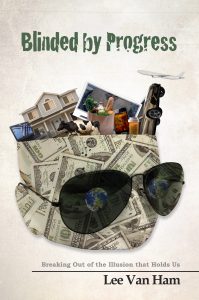by Lee Van Ham
[Note: This blog is excerpted from Blinded by Progress, a book I wrote in 2013, pages 55-56.]
The men who run the global corporations are the first in history with the organization, technology, money, and ideology to make a credible try at managing the world as an integrated economic unit…. What they are demanding in essence is the right to transcend the nation- state and, in the process, transform it.
— Richard J. Barnet and Ronald E. Muller, Global Reach: The Power of the Multinational Corporation
 Until I read David Korten’s When Corporations Rule the World, I thought governments occupied the top of the pyramid of power in the world. But in 2002, that book changed how I saw power function in the world. Thereafter, corporations took over the top spot.
Until I read David Korten’s When Corporations Rule the World, I thought governments occupied the top of the pyramid of power in the world. But in 2002, that book changed how I saw power function in the world. Thereafter, corporations took over the top spot.
I was skeptical as I began reading the book, thinking that the title was tainted with hype to increase the book’s sales. But as I read Korten’s personal story (I knew nothing about him before opening this book), his life experiences softened my skepticism. I learned how he began his career in international development with the United States International Agency for Development (USAID) because he wanted to improve the well-being of countries that were on the margins of the global economy.
He soon became disillusioned, however, as he saw too many development projects bypass the people whom he’d understood USAID wanted to help. In project after project, Korten saw the rewards go to the corporate developers working on the project and to the elites of the countries in which the projects were being constructed. Instead of seeing their lives improved, local community members in these assisted areas were often worse off after the project was completed. They were left with more toxins in their environment and a revised way of life that held little promise. When he spoke to his colleagues about what he saw, he was invited to make changes.
But after eight years of trying to do so and getting few results, he decided that the USAID ship was too big for him to turn around alone. He left and turned his attention to nonprofits as his preferred vehicle for change-making, using his writing, speaking, and management skills to good advantage. The economy became his focus as he realized that his desire to give poor people a better chance required a different economic model than the one corporations were using throughout the global economy.
Further verification of the top role corporate power has in the world came during a telephone conversation with a corporate attorney, Steve Gehring, a longtime friend in Omaha. When I told Steve that I was reading a book called When Corporations Rule the World, I wasn’t sure how he would respond. There wasn’t even a second’s hesitation before I heard him say, “Lee, they already do rule the world.” He said with a tone that let me know he supported Korten’s view. Steve had been representing corporations for decades and was more than willing to express how he saw them at the top of the power hierarchy. He had no disagreement with Korten’s observation that Corporations have emerged as the dominant governance institutions on the planet, with the largest among them reaching into virtually every country of the world and exceeding most governments in size and power. Increasingly, it is the corporate interest rather than the human interest that defines the policy agendas of states and international bodies.
With Korten’s words and Steve’s confirmation, what I’d learned in civics class so many years ago went out the window. Politicians and governments simply are not the primary leaders of the world. My former viewpoint may have fit with the way things were a few decades ago, but not with the rapidly changing present.
Of course, I had been aware for some time of the armies of well-funded corporate lobbyists and the well-oiled, revolving door that sent government leaders into corporations and vice versa. But somehow, this awareness was not the same as putting corporations and their CEOs on the throne; that is, actually seeing them as being in charge. Korten’s book sent me scrambling to catch up with where we are today, instead of where politicians and news analysts say we are. It was another moment when chunks of my old worldview came crashing down around me, a time of further paradigm shift in my life. This changing awareness was no minor adjustment for me. It felt like the stars in a constellation named Power were rearranging themselves and showing me who really ruled the world.





